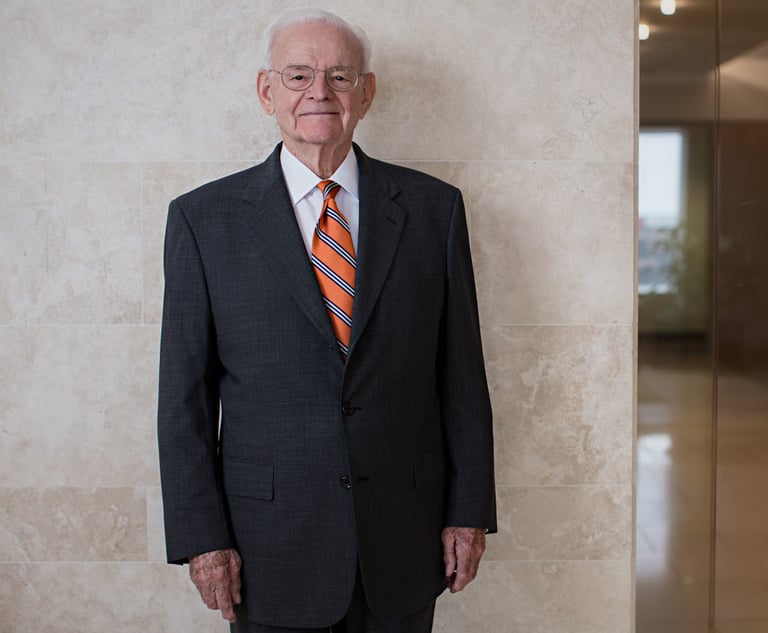No Work-Product Protection for Notes Written by Investigator Hired by Counsel
Work-product protection under Pennsylvania's Rules of Civil Procedure is very narrow for nonattorneys, and that is true even if the work product in question is created by a nonattorney hired by and working at the express direction of counsel.
December 03, 2018 at 04:35 PM
4 minute read
 Kevin P. Allen of Eckert Seamans Cherin & Mellott
Kevin P. Allen of Eckert Seamans Cherin & Mellott
Work-product protection under Pennsylvania's Rules of Civil Procedure is very narrow for nonattorneys, and that is true even if the work product in question is created by a nonattorney hired by and working at the express direction of counsel, see McIlmail v. Archdiocese of Philadelphia, 189 A.3d 1100 (Pa. Super. 2018).
Pa. R. Civ. P. 4003.3 governs work-product issues in civil cases in Pennsylvania state courts. In contrast to the federal work-product rule, work product is generally discoverable in Pennsylvania, unless it falls within one of the exceptions specifically enumerated in Rule 4003.3. Rule 4003.3 treats attorney work product differently than nonattorney work product. For attorney work product, the exceptions to discoverability are broad, and thus the rule provides fairly broad protection for attorney work product.
The same is not true for nonattorney work product. The exceptions to the general rule of discoverability for nonattorney work product are narrow, and thus Rule 4003.3 provides nonattorney work product with only limited protection from discovery. Only a nonattorney's “mental impressions, conclusions or opinions respecting the value or merit of a claim or defense or respecting strategy or tactics” are protected from discovery, see Pa. R. Civ. P. 4003.3; see also American Coal & Minerals v. Henderson Bros., 157 P.L.J. 447, 448-49 (2009).
It has long been clear that the work product of a nonlawyer representative of a client, like a human resources coordinator or a safety investigator, is broadly discoverable in Pennsylvania, even if specifically prepared in anticipation of, or even during, litigation.
It has been less clear how Rule 4003.3 would apply to a nonattorney working for or hired by counsel. Compare, e.g., Brant v. Turnamian, 9 Pa.D.&C.4th 216, 219 (C.P. York 1991) and Briem v. Coppola, 37 Pa.D.&C.3d 350 (C.P. Allegheny 1984). The Brant court held that attorney work-product protection applies to a nonattorney paralegal's work product. By contrast, the Briem court held that witness interview memoranda prepared by an investigator were discoverable as nonattorney work product even though the investigator was hired by and working for counsel.
The Pennsylvania Superior Court recently brought some more clarity to the issue with its McIlmail decision. In McIlmail, the plaintiff's decedent allegedly had been abused by a priest, and the diocese defendant allegedly had concealed the abuse. The diocese hired counsel, and counsel in turn hired a private investigation firm to interview witnesses. The investigator, who was not an attorney, took notes and created memoranda memorializing the witness interviews.
The plaintiff sought those notes and memoranda in discovery. The diocese objected, arguing that, because the diocesan lawyers hired the private investigator, the notes and memoranda were entitled to the broader protection afforded to attorney work product.
The Superior Court disagreed and held that the documents were discoverable because the investigator was a nonlawyer representative of the diocese for purposes of Rule 4003.3 and that, therefore, the investigator's notes and memoranda were not entitled to the broader protection afforded to attorney work product. McIlmail settles the issue conclusively regarding outside investigators or other nonlawyers, even if hired by counsel; their work product will be entitled to only limited nonattorney work product protection.
But, what about the work product of a paralegal, clerk, law student or secretary who is employed directly at a law firm serving as counsel to a party? For instance, if a lawyer delegates to her paralegal or clerk the task of interviewing a witness, and that paralegal/clerk prepares a memorandum to the file or to the attorney regarding the interview, the clear implication of McIlmail, with its emphasis on the need to construe work-product protection narrowly and in strict accordance with the precise provisions of Rule 4003.3, is that the paralegal/clerk's memorandum would not qualify for the broader protection of attorney work product and instead would only be entitled to the much more limited protection available for nonattorney work product.
Thus, Pennsylvania attorneys should be aware that, unless an attorney himself is the author of a memorandum, outline, summary, or similar document, that document likely will be eligible only for very limited work product protection, even if prepared specifically for litigation purposes and even if written by a paralegal or clerk employed by and working at the direction of counsel.
Kevin P. Allen is a member of Eckert Seamans Cherin & Mellott's commercial litigation practice group. He is the author of “The Attorney-Client Privilege and Work-Product Doctrine in Pennsylvania,” now in its fifth edition from PBI Press.
This content has been archived. It is available through our partners, LexisNexis® and Bloomberg Law.
To view this content, please continue to their sites.
Not a Lexis Subscriber?
Subscribe Now
Not a Bloomberg Law Subscriber?
Subscribe Now
NOT FOR REPRINT
© 2025 ALM Global, LLC, All Rights Reserved. Request academic re-use from www.copyright.com. All other uses, submit a request to [email protected]. For more information visit Asset & Logo Licensing.
You Might Like
View All
Commonwealth Court Overturns Award of Damages Assessed Against Landlord on Claims of Unlawful Discrimination
6 minute read

Judge Louis C. Bechtle: An American Jurist Who Relied on Common Sense, Sound Judgment and Fairness
5 minute read
Six Ways Thought Leadership Can Support Your Law Firm’s 2025 Strategic Plan
6 minute readTrending Stories
- 111th Circuit Rejects Trump's Emergency Request as DOJ Prepares to Release Special Counsel's Final Report
- 2Supreme Court Takes Up Challenge to ACA Task Force
- 3'Tragedy of Unspeakable Proportions:' Could Edison, DWP, Face Lawsuits Over LA Wildfires?
- 4Meta Pulls Plug on DEI Programs
- 5On the Move and After Hours: Meyner and Landis; Cooper Levenson; Ogletree Deakins; Saiber
Who Got The Work
Michael G. Bongiorno, Andrew Scott Dulberg and Elizabeth E. Driscoll from Wilmer Cutler Pickering Hale and Dorr have stepped in to represent Symbotic Inc., an A.I.-enabled technology platform that focuses on increasing supply chain efficiency, and other defendants in a pending shareholder derivative lawsuit. The case, filed Oct. 2 in Massachusetts District Court by the Brown Law Firm on behalf of Stephen Austen, accuses certain officers and directors of misleading investors in regard to Symbotic's potential for margin growth by failing to disclose that the company was not equipped to timely deploy its systems or manage expenses through project delays. The case, assigned to U.S. District Judge Nathaniel M. Gorton, is 1:24-cv-12522, Austen v. Cohen et al.
Who Got The Work
Edmund Polubinski and Marie Killmond of Davis Polk & Wardwell have entered appearances for data platform software development company MongoDB and other defendants in a pending shareholder derivative lawsuit. The action, filed Oct. 7 in New York Southern District Court by the Brown Law Firm, accuses the company's directors and/or officers of falsely expressing confidence in the company’s restructuring of its sales incentive plan and downplaying the severity of decreases in its upfront commitments. The case is 1:24-cv-07594, Roy v. Ittycheria et al.
Who Got The Work
Amy O. Bruchs and Kurt F. Ellison of Michael Best & Friedrich have entered appearances for Epic Systems Corp. in a pending employment discrimination lawsuit. The suit was filed Sept. 7 in Wisconsin Western District Court by Levine Eisberner LLC and Siri & Glimstad on behalf of a project manager who claims that he was wrongfully terminated after applying for a religious exemption to the defendant's COVID-19 vaccine mandate. The case, assigned to U.S. Magistrate Judge Anita Marie Boor, is 3:24-cv-00630, Secker, Nathan v. Epic Systems Corporation.
Who Got The Work
David X. Sullivan, Thomas J. Finn and Gregory A. Hall from McCarter & English have entered appearances for Sunrun Installation Services in a pending civil rights lawsuit. The complaint was filed Sept. 4 in Connecticut District Court by attorney Robert M. Berke on behalf of former employee George Edward Steins, who was arrested and charged with employing an unregistered home improvement salesperson. The complaint alleges that had Sunrun informed the Connecticut Department of Consumer Protection that the plaintiff's employment had ended in 2017 and that he no longer held Sunrun's home improvement contractor license, he would not have been hit with charges, which were dismissed in May 2024. The case, assigned to U.S. District Judge Jeffrey A. Meyer, is 3:24-cv-01423, Steins v. Sunrun, Inc. et al.
Who Got The Work
Greenberg Traurig shareholder Joshua L. Raskin has entered an appearance for boohoo.com UK Ltd. in a pending patent infringement lawsuit. The suit, filed Sept. 3 in Texas Eastern District Court by Rozier Hardt McDonough on behalf of Alto Dynamics, asserts five patents related to an online shopping platform. The case, assigned to U.S. District Judge Rodney Gilstrap, is 2:24-cv-00719, Alto Dynamics, LLC v. boohoo.com UK Limited.
Featured Firms
Law Offices of Gary Martin Hays & Associates, P.C.
(470) 294-1674
Law Offices of Mark E. Salomone
(857) 444-6468
Smith & Hassler
(713) 739-1250





